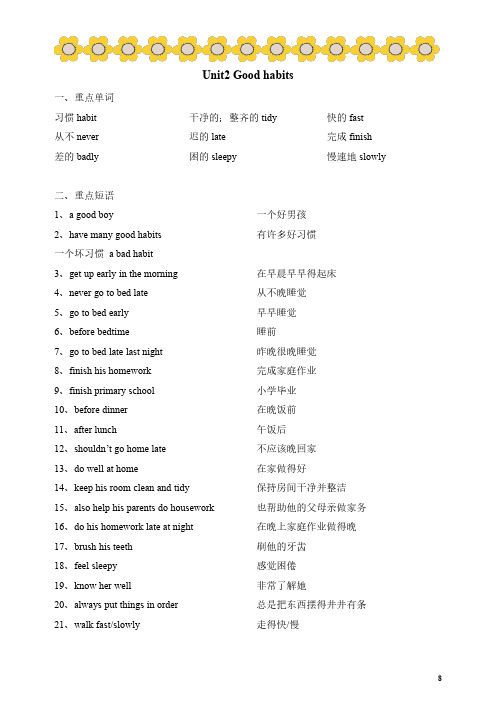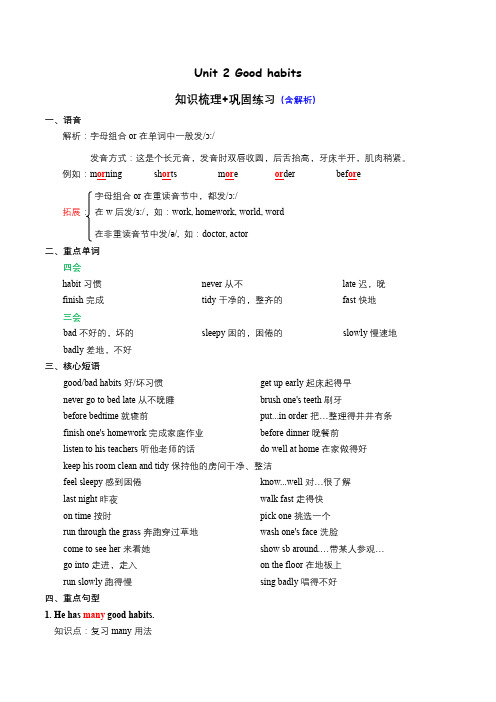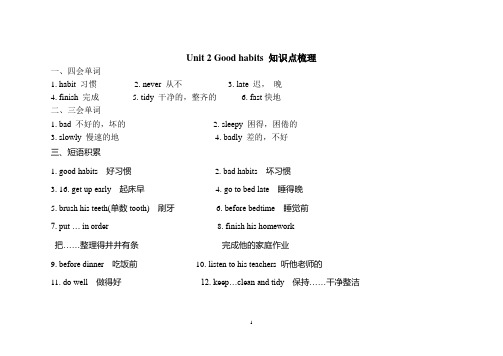新译林版英语六年级下册第二单元知识点梳理
译林版小学英语六年级下册第二单元知识点

译林版小学英语六年级下册第二单元知识点【Story time部分】课文详细解读1.a good boy一个好男孩2.many good habits许多好习惯3.get up early起床早get up动词短语,动词后用副词进行修饰,后面接early副词,意为”早地”;early 做形容词有“早的”含义,故其属于”形容词和副词同形”;同类用法的还有:wake up late醒得晚,study hard努力学习,run fast跑得快,jump high跳得高。
4.go to bed early/late睡觉早/晚5.brush one’s teeth刷牙6.before bedtime睡觉前before在…之前→after在…之后after lunch午餐之后7.put…in order把…整理得井井有条order秩序in order按顺序地、井井有条地8.finish one’s homework完成某人的家庭作业finish完成,结束→begin开始9.listen to one’s teachers听某人的老师们讲课10.at school在学校at+局域性的小地点at the park在公园,at the supermarket在超市11.do well做得好,well此处是副词“好地”12.keep his room clean and tidy保持他的房间干净整洁结构为keep sth.+形容词,意为”保持…”13.have some bad habits有一些坏习惯①have a good habit有一个好习惯,②关于bad的短语:be bad for对…有坏处→反义短语:be good for对…有好处14.do his homework late做他的家庭作业做得晚15.feel sleepy感到困倦feel作为感官动词,后面直接加”形容词”,不需变副词;sleepy困倦的16.know sb.well非常了解某人17.walk fast走得快本单元核心形容词整理:messy脏乱的→tidy整洁的clean干净的→dirty脏的fast快地→slowly慢地early早的/早地→late晚的/晚地good好的→bad坏的/差的well好地→bad坏地【Grammar time部分】单元核心语法解读频率副词:用于表示做某事/某种行为发生的频率大小,一般放在主语和谓语动词之间。
译林版小学英语六年级下册第二单元知识点

Unit2Good habits一、重点单词习惯habit干净的;整齐的tidy快的fast从不never迟的late完成finish差的badly困的sleepy慢速地slowly二、重点短语1、a good boy一个好男孩2、have many good habits有许多好习惯一个坏习惯a bad habit3、get up early in the morning在早晨早早得起床4、never go to bed late从不晚睡觉5、go to bed early早早睡觉6、before bedtime睡前7、go to bed late last night昨晚很晚睡觉8、finish his homework完成家庭作业9、finish primary school小学毕业10、before dinner在晚饭前11、after lunch午饭后12、shouldn’t go home late不应该晚回家13、do well at home在家做得好14、keep his room clean and tidy保持房间干净并整洁15、also help his parents do housework也帮助他的父母亲做家务16、do his homework late at night在晚上家庭作业做得晚17、brush his teeth刷他的牙齿18、feel sleepy感觉困倦19、know her well非常了解她20、always put things in order总是把东西摆得井井有条21、walk fast/slowly走得快/慢22、run very fast跑得非常快23、listen to his teacher at school在学校听老师讲24、have breakfast on time准时吃早饭25、short horses矮矮的马26、run through the grass(跑)穿过草丛27、wash your face at seven o’clock在七点洗你的脸28、come to see her来看她29、show you around the house带你参观房子30、go into the living room进入起居室31、big and clean又大又干净32、small and nice小而干净33、a lot of books and toys许多书和玩具34、on the floor在地上35、under the bed在床下36、put your books and toys in order把你的书和玩具整理好37、sing badly唱得不好38、do badly做得不好39、swim well游得好40、pick one挑一个41、pick up捡起来(pick it up/pick them up)42、pick apples摘苹果43、in the street在街上三、重要知识点动词第三人称单数变化规则(1)直接在动词后+slike-likes play-plays(2)以s,x,sh,ch接尾的动词+eswash-washes watch-watches brush-brushes(3)以辅音+o接尾的动词:+esgo-goes do-does(4)以辅音+y接尾的动词:变y为i+esfly-flies study→studiesEg:用所给词的适当形式填空(一般现在时)1.She______(do)homework by herself.2.Jack______(go)home by bike.3.The giant______(climb)up the beanstalk(豆茎).4.Her mum______(run)to the goose.5.He______(do not)like apple副词和频率副词1.副词的分类I always have breakfast on time.(on time意为“按时,准时”)(1)时间副词:常见的有now,then,soon,ago,lately,later,before,early,today,tomorrow, yesterday,tonight,suddenly,still,just等。
六年级下册英语 Unit 2 Good habits知识梳理+巩固练习 译林版三起

Unit 2 Good habits知识梳理+巩固练习(含解析)一、语音解析:字母组合or在单词中一般发/ɔ:/发音方式:这是个长元音,发音时双唇收圆,后舌抬高,牙床半开,肌肉稍紧。
例如:m or ning sh or ts m or e or der bef or e字母组合or在重读音节中,都发/ɔ:/拓展:在w后发/ɜ:/,如:work, homework, world, word在非重读音节中发/ə/, 如:doctor, actor二、重点单词四会habit习惯never从不late迟,晚finish完成tidy干净的,整齐的fast快地三会bad不好的,坏的sleepy困的,困倦的slowly慢速地badly差地,不好三、核心短语good/bad habits好/坏习惯get up early起床起得早never go to bed late从不晚睡brush one's teeth刷牙before bedtime就寝前put...in order把…整理得井井有条finish one's homework完成家庭作业before dinner晚餐前listen to his teachers听他老师的话do well at home在家做得好keep his room clean and tidy保持他的房间干净、整洁feel sleepy感到困倦know...well对…很了解last night昨夜walk fast走得快on time按时pick one挑选一个run through the grass奔跑穿过草地wash one's face洗脸come to see her来看她show sb around.…带某人参观…go into走进,走入on the floor在地板上run slowly跑得慢sing badly唱得不好四、重点句型1. He has many good habits.知识点:复习many用法用法:many+可数名词复数a lot of +可数名词复数/不可数名词much+不可数名词例:教室里有很多学生。
译林英语六下Unit2知识点(K12教育文档)

译林英语六下Unit2知识点(word版可编辑修改)编辑整理:尊敬的读者朋友们:这里是精品文档编辑中心,本文档内容是由我和我的同事精心编辑整理后发布的,发布之前我们对文中内容进行仔细校对,但是难免会有疏漏的地方,但是任然希望(译林英语六下Unit2知识点(word版可编辑修改))的内容能够给您的工作和学习带来便利。
同时也真诚的希望收到您的建议和反馈,这将是我们进步的源泉,前进的动力。
本文可编辑可修改,如果觉得对您有帮助请收藏以便随时查阅,最后祝您生活愉快业绩进步,以下为译林英语六下Unit2知识点(word版可编辑修改)的全部内容。
Unit2 Good habits一、词组【四会词组】1。
good habits 好习惯2。
bad habits 坏习惯3。
never go to bed late从不晚睡觉4。
walk fast 快速地走4。
finish his homework before dinner 晚饭前完成他的作业6。
keep his room clean and tidy 保持他的房间又干净又整洁【三会词组】1. try to form good learning habits 试着形成好的学习习惯2。
get up early in the morning早上早早地起床 3. before bedtime睡觉前4. put his things in order把他的东西放得井井有条5。
at home在家6。
feel sleepy in the morning早上觉得困7.do well at home在家做得好8. know Liu Tao well很了解刘涛9. last night昨晚10。
go into Tina's bedroom进入蒂娜的卧室11。
do badly at school在学校做得不好12。
run slowly跑得慢二、句子【四会句子】1。
译林版六年级英语下册第二单元知识点

Unit 2 Good habits 知识点梳理一、四会单词1. habit 习惯2. never 从不3. late 迟,晚4. finish 完成5. tidy 干净的,整齐的6. fast快地二、三会单词1. bad 不好的,坏的2. sleepy 困得,困倦的3. slowly 慢速的地4. badly 差的,不好三、短语积累1. good habits 好习惯2. bad habits 坏习惯3. 16. get up early 起床早4. go to bed late 睡得晚5. brush his teeth(单数tooth) 刷牙6. before bedtime 睡觉前7. put … in order 8. finish his homework把……整理得井井有条完成他的家庭作业9. before dinner 吃饭前10. listen to his teachers 听他老师的11. do well 做得好12. keep…clean and tidy 保持……干净整洁13. help his parents 帮助他的父母14. do his homework late 迟做作业15. feel sleepy 感到困倦16. know him/her well 非常熟悉他/ 她17. last night 昨夜18.walk fast 走的快19. show… around 带领……参观20. run fast 跑得快21. sing badly 唱得不好22. go into 走进23. walk slowly 走得慢四、四会句型1. I walk fast in the street. 在街上,我走得快。
2. We / They do well at home. 我们/ 他们在家表现不错。
3. He gets up early in the morning. 他早上早早起床。
译林版六年级英语下册Unit2单元要点(第二学期知识点整理)

39.学习习惯 learning habits
40.一间凌乱的卧室 a messy bedroom
二、重点语法
频度副词:always一直>usually通常>often常常>sometimes有时>seldom很少>never从不用法:放在be动词和助动词后面;行为动词前。
20.按时吃早餐have breakfast on time
21.带你参观我们的房子show you around our house
22. 来看望她 come to see her
23.带某人参观… show sb.around …
24.走进客厅go into the living room
25.在Bobby的卧室in Bobby’s bedroom
13.有一些坏习惯havesome bad habits
14. 做他的作业做得晚do his homework late
15.在晚上at night/ in theevening
16.感到困乏feel sleepy
17.对…十分了解know …well
18.昨天晚上last night
19.走得快walk fast
26.在床下under the bed
27.看见许多玩具在地上see a lot of toys on the floor
28.跑得慢run slowly
29.唱得糟糕sing badly
30. 这是谁的卧室?Whose bedroom is this?
31.上学早go to school early
8.晚饭前完成他的家作finish his homeworkbefore dinner
最新译林 六年级下册 Unit 2 知识点总结

Unit2 Good habits March 7, 201512hobbby爱好;业余爱好;喜欢 habit习惯—指某人有规律地经常做某事,3①Telling the truth is a very good and telling lies is a bad .4②Reading is a good as well as a nice to keep.5③My cousin has a of stamps.6④—What's another girl's hobby? —She is interested in r_______ books.7⑤吃太多的糖果对人们的牙齿没有好处。
8Eating too much ____ ___(糖果) is not good for people's teeth. It’s a bad . 9⑥This is not a match. We're playing chess just for _____.10A. habitB. hobbyC.funD. Game11⑦---Don’t have so much junk food, Andy.12---Sorry, I won’t. I’ll have more fruits and form a good eating _____.13A.hobby B.habit C.list D.menu1415一,词组、短语或句子161.★try to form good learning habits 17试着形成好的学习习惯182. have many good habits有许多好的习惯193. ★get up early in the morning早上早早20地起床214. ★never go to bed late从不晚睡觉225. brush his teeth刷牙236. ★before bedtime睡觉前247. ★at home在家258. ★put his things in order26把他的东西放得井井有条279. finish his homework before dinner28在晚饭前完他的作业2910. listen to his teachers at school30在学校听他老师的话3111. ★do well at home在家做得好3212. ★keep his room clean and tidy33保持他的房间又干净又整洁3413. help his parents帮助他的父母3514. have some bad habits有一些坏习惯3615. do his homework late at night37晚上很晚做他的作业3816. go to bed early早睡觉3917. ★feel sleepy in the morning早上觉得40困4118. ★know Liu Tao well很了解刘涛4219. went to bed late last night昨晚睡觉很43晚4420. ★I’m not sleepy.我不困。
苏教译林版英语 六年级下册 Unit 2 Good habits 知识点总结

苏教译林英语六年级下册Unit 2Good habits 知识点一、词汇habit习惯never从不late迟,晚finish完成tidy干净的,整洁的bad 不好的,坏的sleepy困的,困倦的fast快地slowly慢速地badly差地,不好put…in order把……整理得井井有条last night昨夜二、句型及语法1. He has many good habits. 他有很多好的习惯。
many意为“许多”,修饰或代替可数名词复数,与few(少数)相对;而much用来修饰或代替不可数名词,表示量或程度,与little(少量)相对。
【注】常见的用法:How many…?(问可数名词的“多少”);so many (“如此的多”,修饰可数名词)How much…? (问不可数名词的“多少”或“询问价格”);so much (“如此的多”,修饰不可数名词)2. He gets up early in the morning and never goes to bed late. 他早上起床的早,从不晚睡觉。
○1early与late两者既可以为动词,又可以为副词;再此句中均为副词。
○2in the morning 意为“在早上”(用介词“in”)【注】:常见的词组on Sunday morning “在周日早上”(要注意用介词“on”)this morning “今天早上”(要注意不需要加任何介词)○3never 意为“从不”,为一般现在时的判断词。
3. He brushes his teeth in the morning and before bedtime. 他早上和睡觉前刷牙。
brush one’s teeth 意为“刷牙”;one’s 为形容词性物主代词(my; our; his; her; its; their; your)或者名词所有格形式(Betty’s)等。
before bedtime 意为“睡觉前”,before为介词,意为“在…之前”,其反义词为after(在…之后)。
- 1、下载文档前请自行甄别文档内容的完整性,平台不提供额外的编辑、内容补充、找答案等附加服务。
- 2、"仅部分预览"的文档,不可在线预览部分如存在完整性等问题,可反馈申请退款(可完整预览的文档不适用该条件!)。
- 3、如文档侵犯您的权益,请联系客服反馈,我们会尽快为您处理(人工客服工作时间:9:00-18:30)。
6A Unit 2 What a day!
【单词】
1. sunny 晴朗的
2. show 展示,展览
3. interesting 有趣的,有意思的
4. weather 天气
5. become 变成,变为
6. windy 有风的
7. cloudy 多云的8. high在高处
9. sky天空10. bring 带来
11. honey 蜂蜜12. drink 饮料
13. ant 蚂蚁14. bee 蜜蜂
15. cloud 云16. rain 下雨,雨水(不可数名词)
17. rainy 多雨的,有雨的18. meet 遇到,遇见
19. lose 丢失20. know 知道
21. What happened? 出了什么事?22. climb up 爬上
23. hold onto 抓紧24. fly away 飞走
25. September 九月26. wet 潮湿
27. parrot 鹦鹉28. pick 挑,捡,摘
29. Well done! 做得好!30. sad 伤心,悲伤
【词组短语】
1. What a day!多么……的一天!
2. on 20th September 在9月20日
3. in the morning 在上午
4. a parrot show 鹦鹉展览
5. go to the park by bike 骑自行车去公园
6. some interesting parrots 一些有趣的鹦鹉
7. become windy and cloudy 变得有风和多云
8. fly kites 放风筝
9. high in the sky 高高地在天空中10. It’s time for lunch. 午饭的时间到了。
11. bring some dumplings 带来一些饺子12. some ants 一些蚂蚁
13. black clouds 乌云14. hungry and wet 又饿又潮湿
15. all day 一整天16. bring lunch to the park 带午餐到公园17. well done 干得好, 做得好18. have lunch 吃午饭
19. the New Year 新年20. cheer together 一起欢呼
21. play basketball in the playground 在操场上打篮球
22. go away 离开23. look sad 看起来伤心
24. What’s the matter? 怎么了? 25. lose my new kite 丢失了我的新风筝26. want to know 想知道27. What happened? 出什么事了?
28. climb up the hill 爬上小山29. fly high 飞得很高
30. hold onto 抓紧31. fly away 飞走
32. have a picnic 野餐33. near the hill 在小山附近
34. last Sunday 上星期天35. go swimming 去游泳
36. watch a film 看电影37. do the housework 做家务
38. on Monday morning 在星期一上午39. get up 起床
40. go to school 去上学41. eat our lunch 吃我们的午饭
42. find my new kite 找到我的新风筝
【语法】
1
不规则动词的过去式
本单元出现了许多不规则动词的过去式形式,建议老师在复习时要结合句子加以总结。
如:
1. Liu Tao and I went to the park by bike. (go – went)
2. We saw some interesting parrots. (see – saw)
3. The weather became windy and cloudy. (become – became)
4. We flew kites high in the sky. (fly – flew)
5. We brought some dumplings, some bread and honey and some drinks. (bring – brought)
6. We saw some ants on the bread and honey. (see – saw)
7. We could not eat our lunch. (can – could)
8. I lost my new kite. (lose -- lost)
9. This morning, Tina and I flew my new kite in the park. (fly – flew)
10. The kite flew high, but it flew too high and we couldn’t hold onto it. It flew away.
11. I found it near the hill. (find – found)
12. I got up at seven. (get – got)
13. I went to school at eight. (go – went)
14. We had a picnic last Sunday. (have – had)
15. I did the housework last Sunday. (do – did)
另外,课文中(包含第一单元)出现的一些动词,也有不规则动词过去式形式,可加以补充:meet – met, hold – held, take – took, say – said, tell – told, give – gave, make – made, think – thought, write – wrote, eat – ate
【语言知识点】
1. 本单元story time 是一篇日记,而且checkout time中也要求学生写一篇日记。
建议老师在复习时要指导学生如何写英语日记。
星期和日期写在左上角,天气写在右上角。
日期格式用月日年(美式)或日月年(英式)都可以。
(1)年、月、日都写时,通常以月、日、年为顺序,月份可以缩写,日和年用逗号隔开。
(2)如果要写星期,星期要紧挨日期,它既可以放在日期前面,也可以放在日期后面,星期也可以省略不写。
星期和日期之间不用标点,但要空一格,星期也可缩写。
例如:Thursday Dec. 18, 2003或Dec.18,2003 Thursday
(3)天气情况必不可少。
天气一般用一个形容词如:Sunny, Fine, Rainy, Snowy等表示。
天气通常位于日记的右上角。
in,on,at的时间用法:
in的后面跟比较长的时间段:
in April 在四月,in three days 三天内,in a week 在一周里,in the future 在未来
in也用在早中晚前:
in the morning/afternoon/evening 在早上/下午/晚上
on后面跟的是具体的日期,一般指一天:
on Monday/Tuesday/Wednesday/Thursday 在周一/周二/周三/周四, on the second of March 在三月二日, on Mother’s Day 在母亲节, on your birthday 在你生日
on也用在某一天的早中晚:
on Friday morning在周五早上on Saturday afternoon在周六下午
on Sunday evening在周日晚上on Chinese New Year’s Eve 在除夕夜
2。
